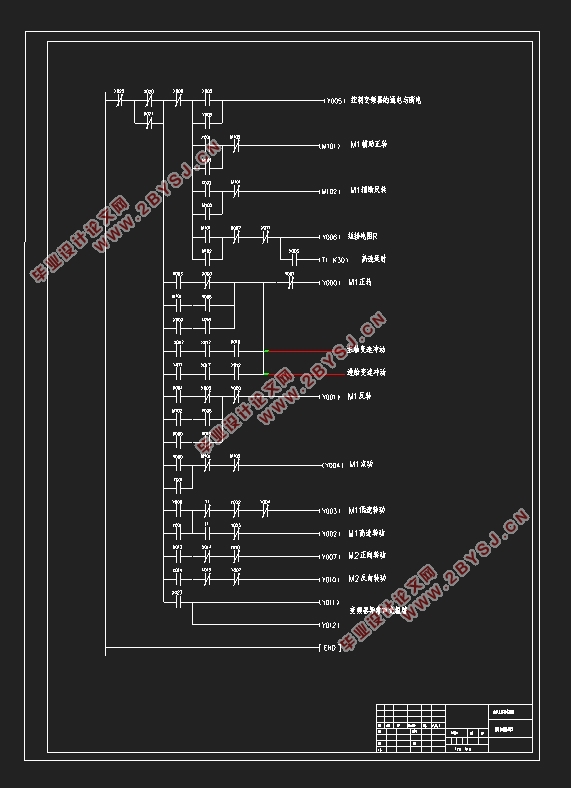基于PLC的T86卧式镗床电气控制系统的设计(含CAD接线图梯形图)
无需注册登录,支付后按照提示操作即可获取该资料.
基于PLC的T86卧式镗床电气控制系统的设计(含CAD接线图梯形图)(论文说明书23000字,外文翻译,CAD图4张)
摘要
随着自动化技术,计算机技术及网络通信技术的迅猛发展,使 PLC的功能日益增多,它不仅能实现单机的控制,而且能实现多机控制,同时随着 PLC技术 的不断发展,在自动化技术的领域中起到了不可忽略的作用,由于 PLC在与继电器的比较中有着许多的功能胜过或者是优于继电器,从而使 PLC 逐步取代继电器,使其自动化控制有了更一步的发展,无论从操作,维修,保养还是从线路的简化等方面都更加的方便,使其优点更加的突出!
在 PLC技术的应用中,电气工程师不需在硬件上花费太多功夫,只考虑将控制按钮或检测传感器连接在 PLC输入点,再通过 PLC内部处理,在输出点连接接触器或继电器,来控制大功率的启动设备,而小功率的输出设备直接连接即可。
设计对T68卧式镗床的结构和工作原理进行介绍,通过镗床继电器控制系统进行分析,提出了基于PLC变频调速控制对T68卧式镗床进行改造的总体方案的设计。根据 PLC的优点对 T68 镗床进行电器线路改造,采用替代设计法,设计PLC控制系统程序。机床原有的操作方式不变,机床的主电路不变,从而使机床的控制线路简化了,机床故障率降低了。通过GX-Simulator6-C软件进行现场模拟,在此基础上,进行了调试对运行中的问题进行分析提出了具体的解决方法和注意事项,提高PLC的控制质量。
关键词:PLC;卧式镗床;变频器;模拟
Design of Electric Control System of T86 Horizontal Boring Machine Based on PLC
ABSTRACT
With the rapid development of automation technology, computer technology and network communication technology, the functions of PLC are increasing day by day. It can not only realize single-machine control, but also realize multi-machine control. At the same time, with the continuous development of PLC technology, it plays an important role in the field of automation technology. Because PLC has many functions better than or better than relays in comparison with relays, PLC gradually replaces relays. Make its automatic control have a further development, no matter from the operation, maintenance, maintenance or from the simplification of the line and other aspects are more convenient, make its advantages more prominent!
In the application of PLC technology, electrical engineers do not need to spend too much effort on hardware, only consider connecting control buttons or detection sensors to PLC input points, and then connecting contactors or relays at output points through PLC internal processing to control high-power starting equipment, while low-power output equipment can be directly connected.
The design introduces the structure and working principle of the T68 horizontal boring machine, analyzes the relay control system of the boring machine, and puts forward the design of the overall scheme of transforming the T68 horizontal boring machine based on PLC frequency conversion speed control. According to the advantages of PLC, the T68 boring machine is reformed in electrical circuit, and the PLC control system program is designed by alternative design method. The original operation mode of the machine tool is unchanged, and the main circuit of the machine tool is unchanged, thus simplifying the control circuit of the machine tool and reducing the failure rate of the machine tool. Through GX-Simulator6-C software for field simulation, on this basis, debugging was carried out to analyze the problems in operation, and specific solutions and precautions were put forward to improve the control quality of PLC.
KEY WORDS: PLC;horizontal boring machine;Inverter;Simulation



目 录
摘要 i
ABSTRACT ii
前言 1
1 T68镗床现状 2
1.1 镗床的结构 3
1.2机床的电力拖动方式 5
1.3 T68型卧式镗床运动对电气控制电路的要求 5
1.4继电器控制电路的分析 6
1.4.2 进给电动机M2的电路分析 11
1.4.3 主电路的分析 11
1.4.4 联锁保护环节的分析 14
1.4.5 辅助电路分析 14
1.5原有继电器控制电路存在的问题 15
2 可编程控制器(PLC)介绍 17
2.1 PLC技术背景 17
2.2 PLC的系统结构 17
2.2.1 软PLC开发系统 18
2.2.2 软PLC运行系统 18
2.4 PLC工作过程 20
2.5 方案拟定 21
3T68卧式镗床的PLC改造系统的硬件设计 23
3.1PLC控制系统设计方法 23
3.1.1PLC控制系统设计的基本内容 23
3.1.2PLC控制系统设计的一般步骤 24
3.2T68卧式镗床控制系统的主电路设计 25
3.3 PLC机型的选择,I/O点分配 26
3.3.1 PLC的选择 26
3.3.2 I/O点统计 27
3.4 硬件电路的设计 28
3.5 变频器的型号的选择与简介 29
3.5.1 变频器的容量的选择 29
4 T68卧式镗床的PLC改造系统软件设计 32
4.1 常用梯形图变成方法 32
4.2 翻译设计法 32
4.2.1 梯形图的设计 33
4.2.2 PLC程序清单 34
4.3 在改造中应该注意的问题 35
5 改造后T68镗床的PLC控制系统安装与调试 36
5.1 程序仿真调试 36
5.1.1 GX系列仿真软件的介绍与使用方法 36
5.1.2 程序的仿真 37
5.1.3 PLC仿真软件调试的监控结果 38
5.2 本系统现场调试 42
5.2.1 程序调试前的准备工作 42
5.2.2 调试中发现的问题及分析 43
6PLC控制系统的抗干扰设计 45
6.1 影响PLC运行可靠性的常见干扰源 45
6.2 常见的抗干扰硬件的设计 45
6.2.1 抗电源干扰措施 45
6.2.2 防I/O信号干扰措施 46
6.3.1 硬件措施 48
6.3.2 软件措施 49
结束语 50
参考文献 52
外文资料 55
中文译文 63
致 谢 68
